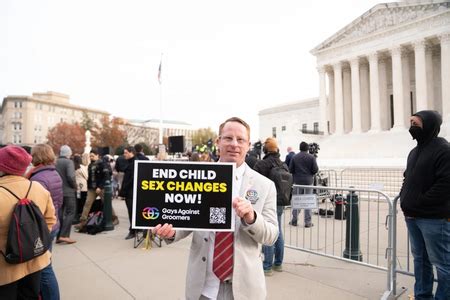
A young woman who detransitioned after undergoing gender-affirming care as a teenager is applauding recent Supreme Court decisions impacting access to such care for minors, viewing them as a safeguard against potentially irreversible medical interventions. Chloe Cole, now 19, who began her transition at age 13 and later detransitioned, has become a vocal advocate against gender-affirming care for minors, expressing regret over her own experiences.
Chloe Cole, who began identifying as transgender at age 12 and started medical interventions a year later, says she now sees the Supreme Court’s actions as a positive step. “These rulings are incredibly important,” Cole stated. “They are a necessary check on a system that, in my opinion, was failing young people. I believe that children are being rushed into making life-altering decisions that they may later regret.” Cole underwent a double mastectomy at 15 and received both puberty blockers and testosterone.
Cole’s story highlights the complexities and controversies surrounding gender-affirming care for minors, a topic that has become increasingly politicized. She has shared her experience extensively, including testifying before legislative bodies and appearing in numerous media interviews.
Cole emphasizes that she doesn’t want to prevent anyone from transitioning, but she believes that young people need more time and a more thorough evaluation before pursuing irreversible medical interventions. “I am not against adults transitioning,” Cole clarified. “My concern is specifically with minors. I believe they lack the cognitive maturity to fully understand the long-term consequences of these procedures.”
The Supreme Court’s involvement in cases related to youth gender care stems from legal challenges to state laws restricting or banning certain medical treatments for transgender minors. While the Supreme Court hasn’t directly ruled on the constitutionality of such bans, its decisions to allow state-level restrictions to remain in place while legal challenges proceed have been interpreted as a signal of potential skepticism toward unrestricted access to gender-affirming care for minors.
Cole’s detransitioning journey began after several years of living as a male. She has spoken about the physical and emotional challenges she faced, including the difficulties of reversing some of the effects of hormone therapy and surgery. Cole has also discussed the psychological impact of realizing that transitioning wasn’t the right path for her.
“Detransitioning is not a simple process,” Cole explained. “It’s physically and emotionally taxing. There are irreversible changes that I have to live with for the rest of my life. I want young people to be fully aware of these risks before they start down this path.”
Cole’s activism is part of a broader movement of detransitioners who are sharing their stories and advocating for more cautious approaches to gender-affirming care for minors. These individuals often argue that young people struggling with gender dysphoria should receive comprehensive mental health support and explore all available options before undergoing medical interventions.
The debate surrounding gender-affirming care for minors is complex and multifaceted, involving medical, ethical, legal, and social considerations. Advocates for gender-affirming care argue that it is medically necessary for some transgender youth and can significantly improve their mental health and well-being. They point to studies showing that transgender youth who receive gender-affirming care have lower rates of depression, anxiety, and suicide.
Opponents of gender-affirming care for minors, on the other hand, express concerns about the potential long-term risks and irreversible effects of medical interventions, particularly puberty blockers, hormone therapy, and surgery. They argue that more research is needed to fully understand the long-term consequences of these treatments and that young people should be given more time to explore their gender identity before making irreversible decisions.
The issue has become highly politicized, with many states enacting laws restricting or banning gender-affirming care for minors. These laws typically prohibit medical professionals from providing puberty blockers, hormone therapy, or gender-affirming surgery to individuals under the age of 18.
The legal challenges to these laws are ongoing, with courts across the country issuing conflicting rulings. The Supreme Court’s involvement in these cases underscores the significance of the issue and the potential for further legal battles in the future.
Cole’s perspective adds another layer to this complex debate. As someone who has personally experienced gender-affirming care and subsequently detransitioned, her voice carries considerable weight. Her advocacy highlights the importance of thoroughly evaluating the potential risks and benefits of gender-affirming care for minors and ensuring that young people are fully informed before making any decisions.
Cole’s story serves as a reminder that gender identity is a complex and personal matter and that there is no one-size-fits-all approach to addressing gender dysphoria. It underscores the need for a comprehensive and individualized approach to care that takes into account the unique needs and circumstances of each young person.
The discussion around gender-affirming care also brings up the question of parental rights versus the rights of children to make their own medical decisions. Some argue that parents have the right to make decisions about their children’s healthcare, while others argue that young people should have the autonomy to make decisions about their own bodies, particularly when it comes to gender identity.
This tension between parental rights and adolescent autonomy is a recurring theme in many areas of healthcare, including reproductive health, mental health, and end-of-life care. There is no easy answer to this question, and different societies and legal systems have different approaches to resolving this conflict.
Ultimately, the debate surrounding gender-affirming care for minors is a reflection of broader societal attitudes toward gender identity, transgender rights, and the role of medicine in addressing complex social issues. It is a debate that is likely to continue for many years to come, with ongoing legal challenges, political debates, and evolving medical understanding.
Chloe Cole’s experience sheds light on the potential pitfalls of rushing into gender-affirming care, particularly for adolescents. She emphasizes the importance of extensive mental health evaluations and thorough discussions with medical professionals before considering irreversible medical interventions. She believes that young people need more time to explore their gender identity and understand the potential long-term consequences of these treatments. Her story is a critical contribution to the ongoing conversation about how best to support young people who are struggling with gender dysphoria.
The debate also necessitates considering the mental health aspect of gender dysphoria. Studies have shown that transgender and gender non-conforming individuals are at a higher risk for mental health issues, including depression, anxiety, and suicidal ideation. This underscores the importance of providing mental health support to young people who are questioning their gender identity, regardless of whether they choose to pursue gender-affirming care.
Many mental health professionals advocate for a comprehensive approach to care that includes therapy, counseling, and support groups. This approach aims to help young people explore their gender identity, address any underlying mental health issues, and make informed decisions about their future.
Furthermore, it’s important to consider the evolving nature of our understanding of gender identity. As societal attitudes toward gender continue to evolve, so too will our understanding of the best ways to support transgender and gender non-conforming individuals. This means that medical and mental health professionals need to stay up-to-date on the latest research and best practices in the field of gender-affirming care.
The media also plays a crucial role in shaping public opinion on this issue. Responsible reporting can help to educate the public about the complexities of gender identity and the challenges faced by transgender and gender non-conforming individuals. Sensationalized or biased reporting, on the other hand, can contribute to misinformation and prejudice.
The story of Chloe Cole and the broader debate surrounding gender-affirming care for minors highlight the need for a nuanced and compassionate approach to this complex issue. It is a conversation that requires open dialogue, respect for differing perspectives, and a commitment to ensuring the well-being of all young people.
Cole’s involvement as an advocate has sparked mixed reactions, with some praising her courage to share her story and others questioning her motives or the validity of her experiences. Critics sometimes argue that detransitioners like Cole are being used by anti-transgender groups to advance their political agenda. However, Cole maintains that her primary concern is the well-being of young people and that she is simply sharing her personal experience to help others make informed decisions.
The complexity of the issue also necessitates an understanding of the different types of gender-affirming care. These can include social transition (e.g., using different pronouns or clothing), puberty blockers (which temporarily suppress the production of sex hormones), hormone therapy (e.g., testosterone for transgender males or estrogen for transgender females), and surgery (e.g., top surgery, bottom surgery). The appropriateness of each type of care depends on the individual’s age, stage of development, and personal preferences.
Puberty blockers, in particular, have been a subject of intense debate. Advocates argue that they can provide young people with valuable time to explore their gender identity without having to go through irreversible puberty changes. Opponents, on the other hand, express concerns about the potential long-term effects of these drugs on bone density, brain development, and fertility.
The long-term effects of hormone therapy and surgery are also a subject of ongoing research. While many studies have shown that these treatments can significantly improve the mental health and well-being of transgender individuals, more research is needed to fully understand the potential risks and benefits.
In conclusion, the issue of gender-affirming care for minors is a complex and multifaceted one, with no easy answers. It requires a nuanced and compassionate approach that takes into account the unique needs and circumstances of each young person. The story of Chloe Cole serves as a reminder of the potential pitfalls of rushing into irreversible medical interventions and highlights the importance of ensuring that young people are fully informed before making any decisions. The ongoing legal and political battles surrounding this issue underscore the need for continued dialogue and a commitment to finding the best ways to support young people who are struggling with gender dysphoria. The Supreme Court’s involvement signals the high stakes of this debate and the potential for significant legal and social changes in the years to come. Cole’s voice, as a detransitioner, adds a critical dimension to the conversation, prompting a deeper examination of the potential long-term consequences of gender-affirming care and the importance of thorough psychological evaluations before medical interventions are considered. Her advocacy emphasizes the need for caution and comprehensive support for young people navigating complex issues of gender identity.
The political climate surrounding transgender issues has become increasingly charged, with significant implications for access to healthcare and legal protections for transgender individuals. The actions of state legislatures and the courts, including the Supreme Court, reflect the deep divisions within society regarding gender identity and the rights of transgender people. Chloe Cole’s story is situated within this broader political and social context, making her voice particularly impactful in the ongoing debate. Her experiences are often cited by those who advocate for stricter regulations on gender-affirming care, while her critics argue that her story is being weaponized to undermine the rights of transgender individuals.
The ethical considerations surrounding gender-affirming care for minors are also paramount. Medical professionals must carefully weigh the potential benefits and risks of each treatment option, ensuring that young people are fully informed and able to make autonomous decisions. This requires a thorough understanding of the individual’s psychological and emotional state, as well as a comprehensive assessment of their gender identity. The ethical principle of “do no harm” is central to this process, as is the commitment to respecting the patient’s autonomy and right to self-determination. The debate also raises questions about the role of parents in making decisions about their children’s healthcare. While parents generally have the right to make medical decisions for their children, this right is not absolute and must be balanced against the child’s best interests.
The scientific evidence regarding the long-term effects of gender-affirming care is still evolving. While some studies have shown that these treatments can improve the mental health and well-being of transgender individuals, more research is needed to fully understand the potential risks and benefits. This uncertainty underscores the importance of a cautious and evidence-based approach to care. Medical professionals should stay up-to-date on the latest research and be transparent with patients about the limitations of our current knowledge. They should also be open to considering alternative treatment options, such as therapy and counseling, before recommending medical interventions. The need for more comprehensive and longitudinal studies on the effects of gender-affirming care is widely recognized within the medical community.
The international perspective on gender-affirming care for minors varies widely. Some countries have adopted a more cautious approach, with stricter regulations and a greater emphasis on mental health support. Other countries have embraced a more permissive approach, with greater access to medical interventions. These differences reflect varying cultural attitudes toward gender identity and the rights of transgender individuals. Comparing and contrasting the approaches taken by different countries can provide valuable insights into the complexities of this issue. It can also help to identify best practices and areas where further research is needed.
Frequently Asked Questions (FAQs)
1. What is gender-affirming care and what does it involve for minors?
Gender-affirming care encompasses a range of medical, psychological, and social interventions designed to support individuals whose gender identity differs from the sex they were assigned at birth. For minors, this can include social transitioning (e.g., using different pronouns and clothing), puberty blockers (medications that temporarily suppress puberty), hormone therapy (e.g., testosterone for transgender males, estrogen for transgender females), and, in some cases, surgery (though surgical interventions on minors are generally less common and more carefully considered). According to the source material, Chloe Cole underwent a double mastectomy at 15 and received both puberty blockers and testosterone. The specific type and timing of care vary based on the individual’s needs, age, and stage of development, always under the guidance of medical professionals.
2. What is detransitioning, and why do some individuals choose to detransition?
Detransitioning refers to the process of ceasing or reversing gender transition. Individuals may choose to detransition for various reasons, including regretting their initial transition, experiencing social or family pressures, facing discrimination, or discovering that transitioning did not alleviate their underlying distress. Chloe Cole, for example, “detransitioned after undergoing gender-affirming care as a teenager” and now expresses regret over her own experiences. Detransitioning can involve stopping hormone therapy, undergoing surgery to reverse previous procedures, and/or adopting a gender identity that aligns with the sex they were assigned at birth. The detransitioning process can be physically and emotionally challenging.
3. What are the arguments for and against gender-affirming care for minors?
Arguments for gender-affirming care for minors emphasize that it is medically necessary for some transgender youth and can significantly improve their mental health and well-being. Studies have shown that transgender youth who receive gender-affirming care have lower rates of depression, anxiety, and suicide. Advocates argue that denying access to this care can have devastating consequences.
Arguments against gender-affirming care for minors express concerns about the potential long-term risks and irreversible effects of medical interventions, particularly puberty blockers, hormone therapy, and surgery. Opponents argue that more research is needed to fully understand the long-term consequences of these treatments and that young people should be given more time to explore their gender identity before making irreversible decisions. Some also question the maturity of minors to make such life-altering decisions.
4. What is Chloe Cole’s perspective on gender-affirming care for minors, and why is it considered significant?
Chloe Cole, who began transitioning at age 13 and later detransitioned, is a vocal advocate against gender-affirming care for minors. She expresses regret over her own experiences and believes that young people are being rushed into making life-altering decisions that they may later regret. Her perspective is considered significant because she has personally experienced gender-affirming care and subsequently detransitioned, giving her voice considerable weight in the debate. She also states she is “not against adults transitioning,” clarifying her concern is “specifically with minors.” Her activism highlights the importance of thoroughly evaluating the potential risks and benefits of gender-affirming care for minors and ensuring that young people are fully informed before making any decisions.
5. What is the Supreme Court’s role in the debate surrounding gender-affirming care for minors, and what are the potential implications of their decisions?
The Supreme Court’s involvement in cases related to youth gender care stems from legal challenges to state laws restricting or banning certain medical treatments for transgender minors. While the Supreme Court hasn’t directly ruled on the constitutionality of such bans, its decisions to allow state-level restrictions to remain in place while legal challenges proceed have been interpreted as a signal of potential skepticism toward unrestricted access to gender-affirming care for minors. These decisions could embolden other states to enact similar restrictions, potentially limiting access to gender-affirming care for transgender youth across the country. The long-term implications of these decisions remain to be seen, but they could have a significant impact on the lives of transgender youth and their families.









